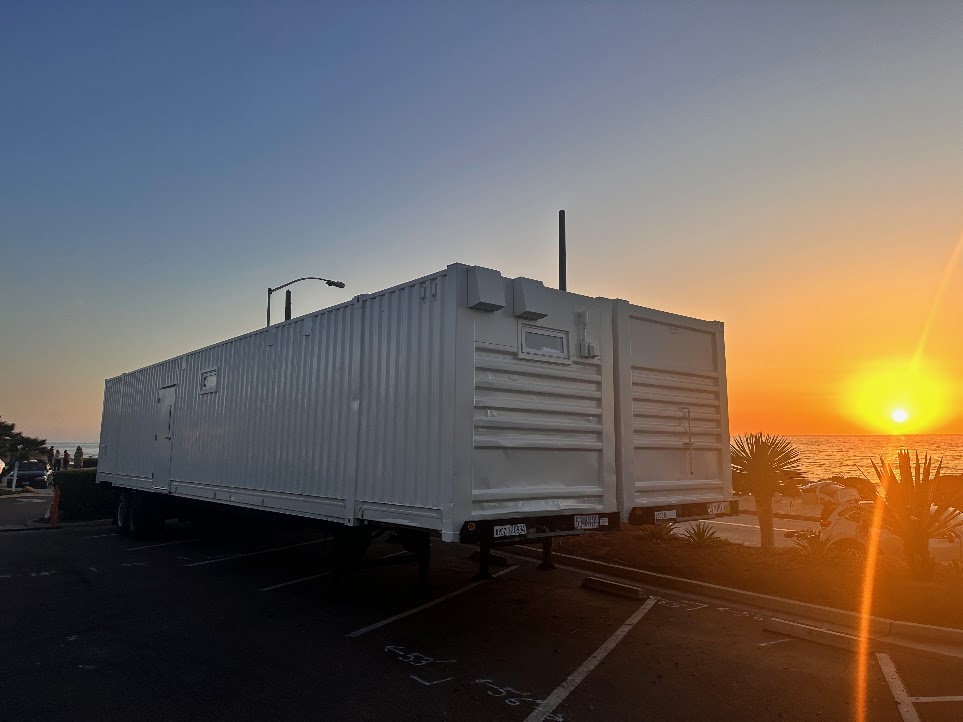
Introduction
If you're thinking about renting a commercial kitchen, you’re likely doing so to streamline production, meet health regulations, or avoid the costs of building from scratch. But there’s one crucial step you can’t afford to overlook: securing the right licenses and permits.
Permitting isn’t just paperwork — it’s the legal framework that allows your food business to operate safely and without interruption. Did you know that failure to secure a food service establishment permit can delay your opening by weeks or worse, shut you down?
This guide walks you through every essential license and approval, from business registration and health department reviews to zoning clearance, fire inspections, and even temporary event permits. You'll also learn why mobile commercial kitchens offer a faster, more flexible alternative to traditional rentals and how companies like Mobile Culinaire can simplify the entire process from day one.
Why Commercial Kitchen Permits Matter
Renting a commercial kitchen may seem as easy as signing a contract, but food service is one of the most regulated industries in the U.S. Permits are essential for public safety, environmental sustainability, and fire prevention. The FDA and local health departments closely monitor foodservice establishments.
The Risk of Operating Without Proper Permits
- Health Risks: Improper sanitation can lead to foodborne illnesses. The CDC estimates 48 million Americans get sick from foodborne pathogens each year.
- Financial Penalties: Cities can levy fines ranging from $500 to $5,000 per violation.
- Legal Exposure: Without proper licensing, your business can’t obtain liability insurance or legally sell food products.
- Shutdown Orders: Health departments have the authority to immediately close unlicensed kitchens.
Note: Even using a commercial kitchen for rent temporarily still requires full compliance with fire, health, and zoning rules.
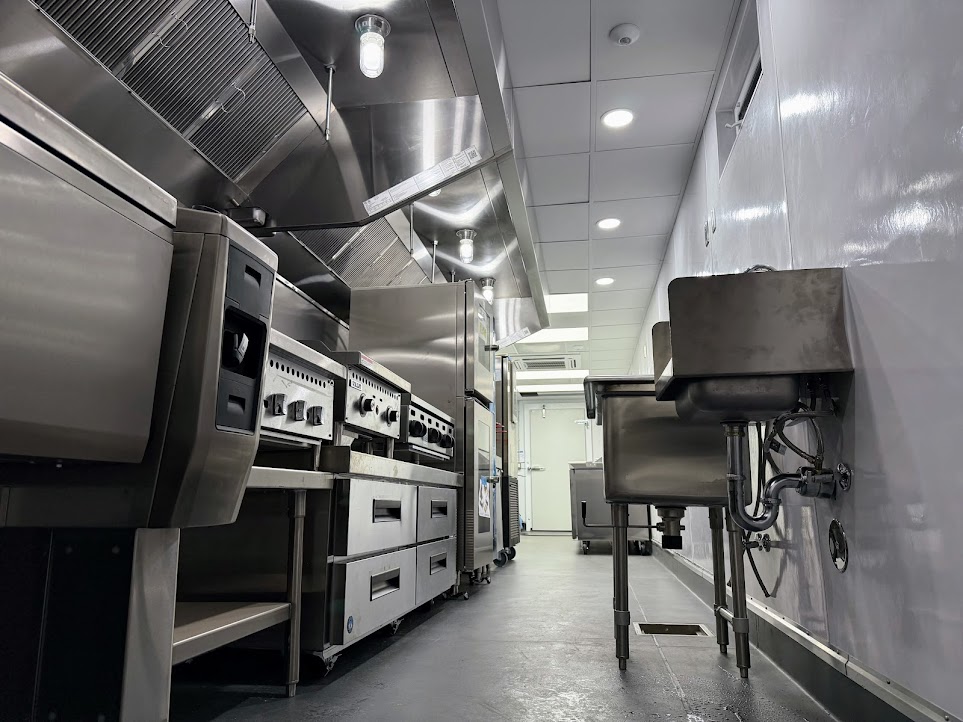
Types of Commercial Kitchens & How Permits Vary
Not all commercial kitchens are created equal. Your permitting path depends on the type of kitchen you use:
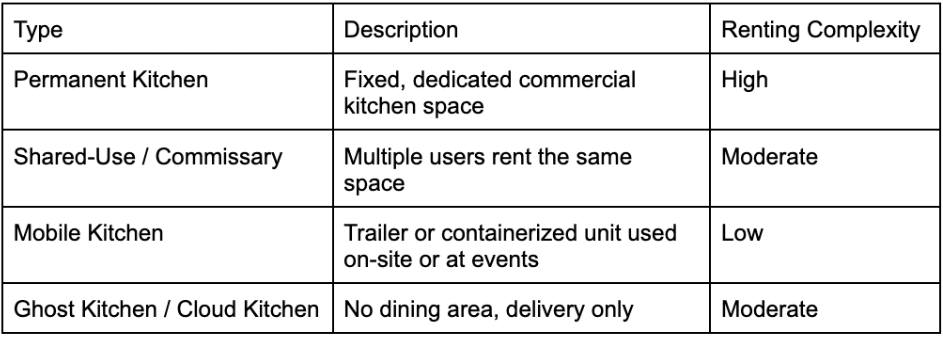
Essential Permits & Licenses Required to Rent a Commercial Kitchen
Business License
When it's needed: Before signing any rental contract or starting operations.
A business license authorizes you to legally operate in your city or county. It’s the foundational permit for launching any commercial enterprise, including food service. Issued by local government agencies such as your city clerk’s office or via platforms like the U.S. Small Business Administration, this license allows you to register your business, open a bank account, sign contracts, and pay local taxes.
Tip: Make sure the business name on this license matches the one listed on your other food operation permits to avoid bureaucratic delays.
Health Department Approval
When it's needed: Before kitchen build-out or equipment installation.
This is the initial plan review phase conducted by your local health department. It evaluates your kitchen’s layout, equipment placement, sanitation setup, and overall food flow. This step is required by most jurisdictions following the FDA’s Food Code and is essential if you're customizing your own rented space, such as a modular kitchen or mobile unit.
Note: Starting construction without prior approval may result in major rework or fines.
Certificate of Occupancy
When it's needed: After build-out, before moving in.
This certificate verifies that your kitchen facility complies with zoning, construction, and life-safety codes. It's usually issued by your local building or zoning department.
Tip: In shared-use kitchens, the facility owner usually holds this but if you're renting a shell space, you’ll likely need to obtain it yourself.
Fire Department Inspection Certificate
When it's needed: Just before opening for business.
Your kitchen must pass a fire safety inspection before operations begin. Inspectors will verify compliance with commercial kitchen fire codes like NFPA 96, checking ventilation hoods, grease containment, fire suppression systems, and emergency exits. This applies to both permanent kitchens and mobile food units.
Tip: If using a mobile kitchen trailer, ask the provider if a fire safety certificate is already included.
Food Service Establishment Permit
When it's needed: Immediately before opening.
Issued after the final health inspection, this permit allows you to legally operate your kitchen and prepare food. It focuses on active operations: cleanliness, food storage, temperature control, and sanitation practices.
Note: This is your official operating license from the health department and is subject to regular inspections.
Food Facility Health Permit
When it's needed: At the facility level, concurrent with business setup.
This permit verifies that the physical kitchen space meets health and safety infrastructure standards: including non-slip flooring, adequate sinks, proper ventilation, and pest prevention measures. These requirements are typically enforced by your county health department and follow guidance from local regulatory authorities.
Tip: If renting a shared kitchen, ask whether the facility holds this permit and if tenants need their own inspection.
.jpeg)
Food Handler’s License
When it's needed: During employee onboarding.
This license confirms that individual employees have completed state-approved food safety training. Required for anyone handling or preparing food, it’s often mandated within the first 30 days of employment.
Note: Online programs like ServSafe are accepted in most states.
Employee Health Permit
When it's needed: During operational setup with hired staff.
Some local health departments require businesses to obtain a permit registering all food-handling employees. This may include maintaining proof of food handler certification, health screening, or vaccination records.
Tip: Check your city or county health department for local employer obligations as requirements vary widely.
Seller’s Permit
When it's needed: Before your first sale.
A seller’s permit (or sales tax permit) allows you to collect and remit sales tax on prepared food. It’s issued by your state’s Department of Revenue, such as the California Department of Tax and Fee Administration or Texas Comptroller of Public Accounts.
Tip: Even if you're not a retail storefront, most catering and delivery operations still need this permit.
Catering Business License
When it's needed: If you're serving food off-site.
This license applies if your business prepares food in a commercial kitchen and serves it at weddings, events, or other external locations. It may require vehicle inspection and proof of commissary kitchen usage.
Note: Not every state requires this as a standalone license but in many cases, it's bundled with health or mobile food permits.
Zoning Clearance
When it's needed: Before signing a rental contract or placing a mobile kitchen unit.
Zoning clearance ensures the property you're operating from is legally approved for food service use. Local planning or zoning departments will confirm whether commercial kitchen activity is permitted on the site, especially critical for outdoor setups, parking lots, or unconventional locations like warehouses or private land.
Tip: Don’t assume existing buildings are zoned correctly. Always verify zoning designations if you're placing a mobile kitchen, leasing raw space, or converting a non-food-use property.
Temporary Event Permit
When it's needed: For short-term food service at festivals, markets, or one-time events.
This permit allows you to operate a food business at a specific event or venue for a limited time, such as a farmers market, concert, corporate gathering, or public festival. Issued by local health departments (and sometimes parks or city agencies), it typically requires proof of commissary use, food handling certification, and on-site equipment setup.
Note: Requirements for temporary event permits can vary widely by jurisdiction and often have tight submission deadlines. Always apply early and confirm logistics like potable water, handwashing, and waste disposal ahead of time.
%2520(1).jpeg)
Step-by-Step Checklist to Secure Your Commercial Kitchen Permit
Securing the right permits doesn't have to be overwhelming. Follow this sequence to streamline the process and avoid costly delays:
1. Register Your Business
Begin by choosing your business structure (LLC, sole proprietorship, etc.) and registering it with your state. Use the SBA’s license and permit tool to find what’s required in your area based on your business type and location.
2. Secure a Commercial Kitchen Location
Whether you're renting a commissary kitchen, modular container unit, or building out your own space, make sure the facility complies with local health, fire, and zoning codes before signing a rental contract.
3. Submit Floor Plans and Operational Procedures
Before construction or food prep begins, most health departments require detailed kitchen plans along with food safety protocols, sanitation workflows, and equipment specs.
4. Schedule Inspections
Once your kitchen is set up, coordinate inspections from your local fire marshal and health department. Both must sign off before operations can legally begin.
5. Pay All Applicable Fees
Application fees vary widely by jurisdiction. Be prepared to pay for your business license, permit processing, inspections, and possibly plan reviews or zoning applications.
6. Receive Final Approvals and Display Permits
Once approved, display all licenses and permits (especially health, fire, and business licenses) in a visible area of your commercial kitchen, as required by law.
.jpeg)
Common Pitfalls and How to Avoid Permit Delays
Even seasoned food entrepreneurs make simple mistakes that can slow down the approval process. Here’s how to stay ahead:
Incomplete Paperwork
Submitting permit applications with missing forms, outdated information, or incorrect contacts can delay approvals by weeks. Double-check submission guidelines for every agency involved, especially the health and building departments.
Misunderstanding Commercial Kitchen Size Implications
The size of your kitchen directly affects the regulations it must meet. Kitchens larger than 1,000 square feet often require enhanced suppression systems, dedicated exits, and upgraded utilities. These thresholds are defined by local building and fire departments, typically referencing ICC occupancy and fire code standards.
Last-Minute Applications
Don’t wait until the week before opening to apply. Some counties require 30–45 days to review kitchen plans, conduct inspections, and issue permits. Start early, especially if you’re customizing a modular or mobile unit.
.jpeg)
Why Rent a Mobile Commercial Kitchen Instead of a Traditional One?
If you’re exploring kitchen rentals for your food operation, you may be weighing the difference between a traditional brick and mortar commercial kitchen and a mobile commercial kitchen. Here’s why more food businesses, event caterers, and hospitality groups are choosing mobile solutions:
Faster Setup & Less Waiting
Traditional kitchen rentals often involve lengthy contracts, zoning reviews, and multiple inspections before you can even move in. A mobile kitchen, on the other hand, can be delivered and operational in as little as one day, with utilities connected and equipment ready to go.
Why it matters: When speed to market matters, such as during renovations, emergencies, or event prep, mobile kitchens eliminate downtime.
Flexible & Short-Term Commitments
Most fixed-location kitchens require long-term rental contracts, deposits, and extensive paperwork. Mobile commercial kitchens offer flexible rental terms: ideal for seasonal demand, short-term projects, or testing new markets without locking yourself into multi-year contracts.
Why it matters: You rent for the time you need, not longer which frees up capital and reduces risk.
No Buildout & No Construction Delays
A rented commercial kitchen space might require tenant improvements, hood installation, HVAC work, and ADA retrofitting - all of which add time and cost. Mobile kitchens arrive fully built and code-compliant, with no need for permits or construction delays.
Why it matters: You avoid delays caused by contractors, permitting bottlenecks, or building codes.
Deployable Anywhere
Mobile kitchens offer something fixed kitchens can’t: location flexibility. Whether you’re serving food at a festival, remote site, hotel property, disaster zone, or temporary venue - your kitchen goes where you go.
Why it matters: You can support pop-up activations, cater off-site, or expand into new service areas without needing real estate.
Lower Upfront Costs
Between security deposits, architectural drawings, construction delays, and permit requirements, renting or building a traditional commercial kitchen can become prohibitively expensive. In contrast, mobile kitchen rentals start as low as $5,000, making them an attractive option for businesses that want to reduce capital expenditure.
Why it matters: You keep your cash flow healthy and scale at your own pace.
Built for Compliance
Modern mobile kitchen trailers are designed with health codes and fire regulations in mind from day one, often exceeding local standards. Many are pre-approved for rapid permitting, making them inspection-ready upon arrival.
Why it matters: You avoid hidden upgrade costs or failing inspections due to outdated infrastructure in older rental kitchens.
Purpose-Built for Food Operations
Unlike some traditional rentals, which might be converted retail or industrial spaces, mobile kitchens are engineered specifically for cooking, prep, and food safety. That means smarter layouts, efficient workflows, and ready-to-use equipment.
Why it matters: You get a high-performance kitchen, not just four walls and a stove.
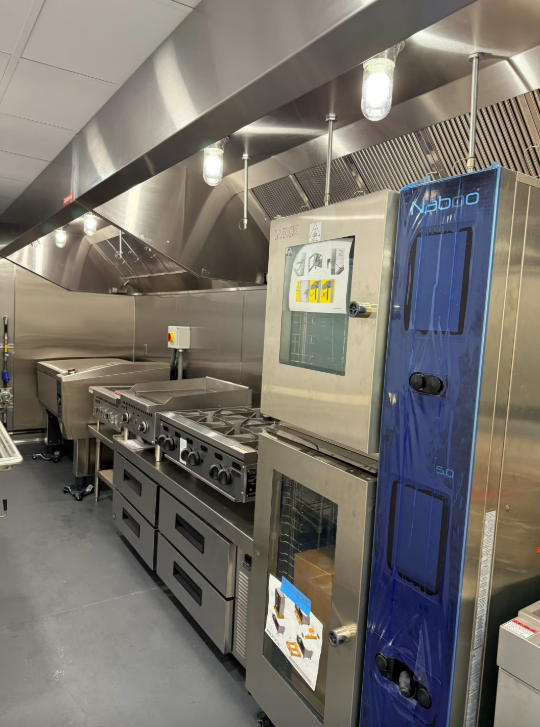
How Mobile Culinaire Makes Renting a Mobile Kitchen Effortless
Built In-House
We don’t outsource our kitchens, we design and build them ourselves. With over 400 units produced, every Mobile Culinaire trailer reflects deep operational insight and hands-on engineering. That means better layouts, better durability, and zero surprises.
The advantage: You get a kitchen tailored for real-world performance, not a retrofitted trailer built for storage.
Delivered Turnkey
Each kitchen arrives fully outfitted with commercial equipment, exhaust hoods, and HVAC systems: pre-wired and pre-plumbed for immediate hookup. No guesswork. No missing parts.
The advantage: You’re cooking within hours and not stuck coordinating vendors or chasing permits.
Inspection-Ready by Design
Our units are built to meet or exceed the most stringent health, fire, and safety codes across the U.S. From ventilation to grease management, we embed compliance into every square inch.
The advantage: You pass inspections faster, avoid retrofits, and stay focused on food code.
Streamlined Setup & Low Downtime
All Mobile Culinaire kitchens feature plug-and-play utility connections, designed for rapid deployment. Whether it’s a short-term event or an emergency install, our systems are built to get you up and running fast.
The advantage: Less downtime. More service hours. Better ROI.
Expert Guidance on Codes and Permitting
Renting a kitchen isn’t just about equipment, it’s about navigating compliance. Our team brings specialized knowledge of mobile kitchen regulations, commissary agreements, and local inspection protocols.
The advantage: You don’t have to figure it out alone since we help smooth the path to legal operation.
Flexible Terms for Real-World Needs
From temporary builds and hospitality overflow to post-disaster recovery, we offer rental terms that match your timeline. Our approach is consultative, not cookie-cutter.
The advantage: You get what you need, when you need it. There are no rigid contracts or red tape.
Service That Doesn’t Stop at Delivery
From inquiry to pickup, we manage every touchpoint with precision. We handle logistics, delivery, setup coordination, and off-boarding so you can concentrate on your kitchen, not project management.
The advantage: Total peace of mind: no contractors, no chaos, just a working kitchen on wheels.
%2520(1).jpeg)
Conclusion
Securing a commercial kitchen doesn't have to mean navigating endless red tape, locking into rigid contracts, or delaying your operations for months. Whether you're launching a new concept, managing a renovation, responding to a crisis, or scaling up for demand — renting a mobile commercial kitchen is often the faster, more flexible, and more cost-effective choice.
And when it comes to mobile kitchen rentals, Mobile Culinaire leads the way.
With in-house manufacturing, code-compliant designs, turnkey equipment, and a rental experience built around your timeline, Mobile Culinaire eliminates the typical friction of food facility permitting and setup. We’re not just providing trailers — we’re delivering peace of mind, operational speed, and long-term reliability.
Explore our fully-permitted mobile kitchens or contact us today to streamline your setup with Mobile Culinaire.
People Also Ask (FAQ)
What permits do I need to operate a temporary commercial kitchen?
To operate a temporary commercial kitchen, you typically need a business license, food service establishment permit, health department approval, and fire inspection certificate. Depending on your location and setup, you may also require zoning clearance or temporary event permits.
Does commercial kitchen size affect the permits required?
Yes. Kitchen size can directly impact permitting requirements. Larger kitchens (e.g., over 1,000 sq ft) may trigger stricter fire suppression rules, exit accessibility codes, and zoning limitations. Always check local regulations, as some cities classify kitchens by square footage when determining compliance thresholds.
Can I start cooking in a rented commercial kitchen before getting permits?
No. Starting operations without the proper permits, including health and fire clearances, is a violation in most jurisdictions. This can result in fines, shutdown orders, or even loss of insurance coverage. Always complete the full permitting process before any food preparation begins.
Testimonial

"What is standing out when you look at the mobile kitchen operation is the efficiency that we can really achieve because it's built for that."
Tell us about your kitchen needs and request a quote.
.png)
Turnkey mobile kitchen
.png)
Proudly made in-house in the USA
.png)
Commercial grade kitchen equipment
.png)
Code-compliant
Trusted by Industry Leaders



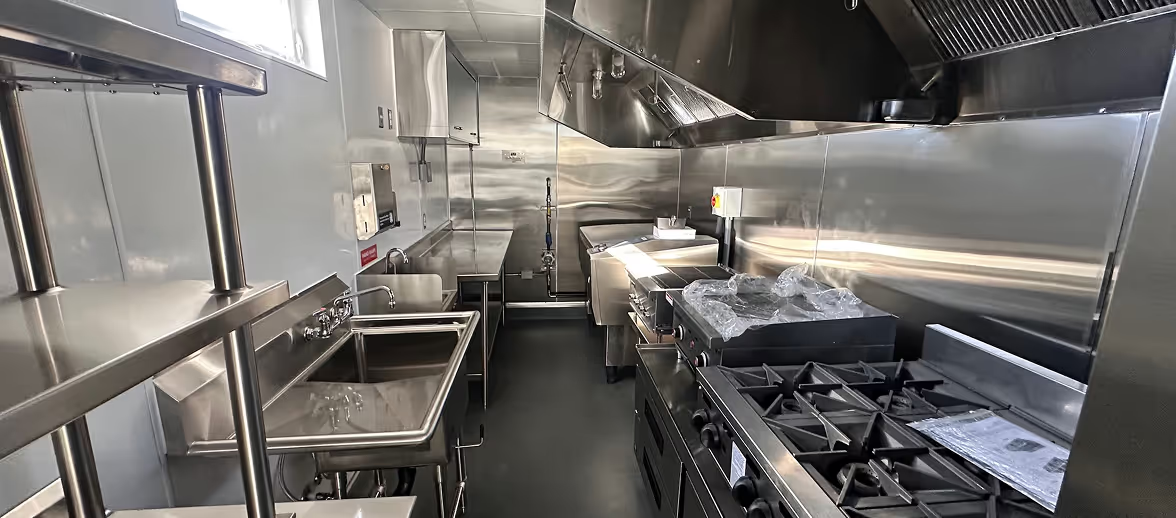
.gif)

%20(1).avif)
%20(1).avif)
%20(1).avif)